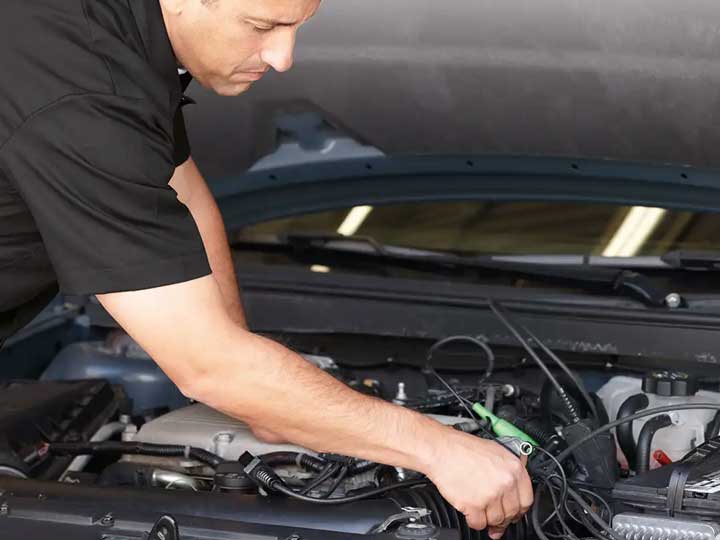Keep your battery in good condition
Your battery is an essential element of your car. Learn everything you need to know about caring for yours with our Guide to Battery Care.
Battery basics
Your car battery is essential, without it you would have no engine, no power and no lights. It’s important to understand a little bit about how your battery functions, and to recognise the most common signs of a battery that needs to be replaced.
There are some simple ways that you can help extend the life of your battery, as well as warning signs that can alert you to any potential problems.
Get checked

Regular replacement
Your car battery needs to be replaced around every four years even if it isn’t causing you any problems. There are sometimes signs that your car battery may need replacing, including:
Trouble starting
If the car battery is too weak to provide a sufficient voltage to the starter, you’ll hear a distinctive clicking sound and the engine won’t crank over. If the car struggles to turn over, but then the engine starts up without a problem, the battery is the likely cause.
Dimming headlights
If your vehicle’s headlights appear to be less bright than normal this could be a sign that your car battery needs replacing. If the headlights fade while the engine is being started or just after it has started then you should get your battery checked.
Auxiliary systems
If your auxiliary systems are not performing as usual, for example electric windows operating slowly or the dashboard lights being dim, it could be a sign that your battery needs charging or replacing.
Bad smells
An obvious warning sign that there is a problem with your vehicle’s battery is an unusual smell, which can indicate the presence of sulphur as a result of the battery overheating.
Visual signs
Check regularly for signs of corrosion or dirt, and make sure that the battery case is neither cracked nor broken. You should also check that the battery cables are not frayed or corroded and that the clamps of the battery are not badly corroded.
Battery care tips
Here are some simple tips to help you keep your battery healthy and your Mitsubishi performing to an optimal level.
Keep your battery clean and dry
Dirt and dampness can lead to a discharge and corrosion which will affect your battery’s performance.
Keep your battery charged
Leaving your vehicle stationary for long periods will affect your battery’s charge and reduce the life of your battery. It’s important to keep a battery fully charged by making sure that the vehicle is driven regularly.
Regular servicing
Poor engine condition can overload the battery and reduce its life. To ensure optimum performance your vehicle should be serviced by a Mitsubishi dealer according to the service schedule.
Avoid draining
Avoid regularly using auxiliary systems, such as the radio or air conditioning, when the engine isn’t on. This will discharge the battery which will then require a recharge and constant recharging may shorten the life of your battery.
Don’t jump start a flat car battery
Jump-starting a car battery can damage the electronics in many modern cars. Ensure that you have Mitsubishi Assistance Package breakdown assistance.
Ensure your battery water level is always topped up
The electrolyte level in the battery should always be within the specified limit on the outside of the battery. This should be checked monthly in accordance with your owner’s manual and topped up as required.
Handling your battery safely
For your own safety we recommend that you have your battery checked by a professional if you are having any trouble with it. However if you do need to handle the battery yourself here is a list of health and safety tips:
- Do not place metallic objects on top of the battery as this may cause the battery to ‘short’
- Keep flames and sparks away from batteries as they contain hydrogen gas and may catch fire or explode
- Batteries contain sulphuric acid so make sure no part of your body or anything damageable comes into contact with the acid. If this happens, use large amounts of water to neutralise and flush acid away
- Batteries are heavy so use correct lifting procedures and if the battery has one, use the carry handle to move the battery
- Keep children away from batteries
